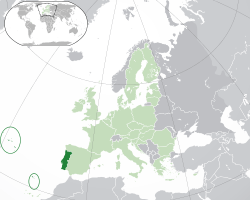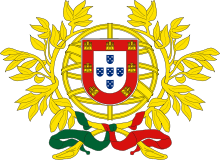Autonomous Regions of Portugal
| Autonomous Region | |
|---|---|
 | |
| Category | 1st-level administrative division |
| Location | Portugal |
| Created by | Portuguese Constitution |
| Created | 1976 |
| Number | 2 |
| Populations |
246,746 (Azores) 267,785 (Madeira) |
| Areas |
2,333 km² (Azores) 801 km² (Madeira) |
| Government |
Regional Assembly Regional Government Representative of the Republic |
| Subdivisions |
Municipality Parish |
 |
| This article is part of a series on the politics and government of Portugal |
| Constitution |
|
Legislature |
| Foreign relations |
The two Autonomous Regions of Portugal (Portuguese: Regiões Autónomas de Portugal) are the Azores (Região Autónoma dos Açores) and Madeira (Região Autónoma da Madeira). Together with Continental Portugal (Portugal Continental), they form the whole of the Portuguese Republic.
Constitution
The autonomous regions were established due to their distinct geography, economy, social and cultural situation, as well as their historical autonomic aspirations of its island populations.[1] Although it is a politico-administrative autonomy the Portuguese constitution specifies both a regional and national connection, obliging their administrations to maintaining democratic principles and promote regional interests, while still reinforcing national unity.[1] The third clause of article 255 of the Portuguese Constitution specifically points to maintenance of national integrity and sovereignty of the Portuguese State.[1]
Administration
As defined by the Portuguese constitution and other laws, an autonomous region possesses its own political and administrative statute and has its own government. The branches of Government are the regional executive (Governo Regional) and the legislative assembly (known as the Assembleia Regional). The assembly is elected by universal suffrage, using the D'Hondt method of proportional representation.
Originally, the sovereignty of the Portuguese Republic was represented in each autonomous region by the Minister of the Republic (Ministro da República), proposed by the Government of the Republic and appointed by the President of the Republic. After the sixth amendment to the Portuguese Constitution was passed in 2006, the Minister of the Republic was replaced by a less-powerful Representative of the Republic (Representante da República) who is exclusively appointed by the President.
The president of the regional executive (the Presidente do Governo Regional) is appointed by the Representative of the Republic according to the results of the parliament election.
Current Presidents of the Regional Executive:
See also
References
- 1 2 3 "Art.255", Constituição da República Portuguesa (PDF) (in Portuguese) (VII Revisão Constituicional ed.), Lisbon, Portugal, 2005, retrieved 5 August 2005